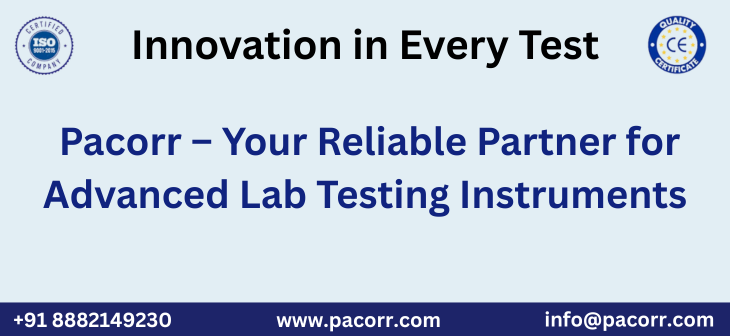
Understanding the Role of Pacorr Tensile Testing Machine in Material Strength Analysis
Pacorr Tensile Testing Machine is a highly advanced and reliable instrument designed for accurate material strength analysis across diverse industries. With the ever-increasing need for superior quality and safety, understanding the mechanical properties of materials has become critical. Whether you are in manufacturing, construction, automotive, aerospace, or research, tensile testing remains the gold standard for determining a material’s strength and ductility. Using the Pacorr Tensile Testing Machine ensures precise measurement of how materials respond to stretching or pulling forces, giving you the data needed for effective quality control and product development.
What is a Tensile Testing Machine?
A tensile testing machine, also known as a universal testing machine (UTM), is an essential laboratory device used to evaluate the tensile properties of materials. The core function is to apply a controlled tension (pulling force) to a specimen until it fractures, while accurately recording the force and the elongation experienced. Pacorr Tensile Testing Machine stands out for its robust construction, user-friendly interface, and highly sensitive load measurement, making it ideal for testing metals, plastics, rubbers, textiles, and composites.
Why Use Pacorr Tensile Testing Machine for Material Strength Analysis?
Material strength analysis is crucial for ensuring that products meet industry standards and safety requirements. The Pacorr Tensile Testing Machine provides repeatable and accurate results that help manufacturers make informed decisions. Here are some benefits:
- Precise Strength Measurement: Accurate determination of yield strength, ultimate tensile strength, and elongation.
- Versatility: Suitable for a wide range of materials and applications.
- Compliance with Standards: Supports testing as per ASTM, ISO, and other international standards.
- Data Logging and Analysis: Advanced models provide computerized data logging for better traceability.
- Durability: Sturdy design for long-term, reliable usage.
Step-by-Step Guide: How to Use Tensile Testing Machine for Material Strength Analysis
1. Preparing the Pacorr Tensile Testing Machine
Before starting the test, ensure that the machine is correctly installed and calibrated. Follow these initial steps:
- Calibration: Make sure the load cell and extensometer are calibrated as per standard procedures.
- Machine Setup: Choose the appropriate grips and fixtures based on the type and shape of the material sample.
- Check Capacity: Verify that the machine’s maximum load (e.g., Tensile Testing Machine – Capacity – 5000 KGF) is suitable for your test.
2. Sample Preparation
Proper specimen preparation is vital for valid test results. The sample must conform to the size and shape specified by relevant standards (such as ASTM D638 for plastics or ASTM E8 for metals).
- Cutting the Specimen: Ensure clean and accurate dimensions.
- Marking Gauge Length: Mark the initial gauge length on the sample for elongation measurement.
- Conditioning: Some materials require conditioning under controlled temperature or humidity.
3. Mounting the Specimen
- Securing the Sample: Insert the specimen into the machine grips, ensuring it is centered and aligned to avoid bending or uneven force distribution.
- Tightening the Grips: Secure the specimen firmly, but avoid excessive tightening that could cause premature breakage.
4. Configuring Test Parameters
Modern Pacorr Tensile Testing Machines allow you to set test parameters through a digital interface or computer software.
- Set Test Speed: Select the appropriate crosshead speed as per material and test standards.
- Choose Test Type: Select the test mode (tension, compression, or elongation as required).
- Input Sample Details: Enter the specimen dimensions and other relevant data.
5. Running the Test
- Start the Test: Initiate the test sequence from the control panel or software.
- Monitor Progress: Observe the real-time force-elongation graph on the display.
- Automatic Recording: The machine automatically records load and extension at regular intervals.
6. Observing and Recording Results
- Break Point: The machine will stop automatically once the sample breaks.
- Collect Data: Record key values like maximum load, elongation at break, yield point, and modulus of elasticity.
- Data Analysis: Export test data for analysis, reporting, or quality documentation.
Interpreting the Test Results: What Do You Learn?
The primary goal of tensile testing is to determine how a material reacts under tension, which directly impacts its application in the real world. Key data obtained include:
- Yield Strength: The stress at which material starts to deform permanently.
- Ultimate Tensile Strength (UTS): The maximum stress the material can withstand.
- Elongation at Break: The material’s ability to stretch before rupture.
- Modulus of Elasticity: Indicates material stiffness.
Using these parameters, engineers and quality control professionals can assess whether a material meets required specifications for intended use.
Applications of Pacorr Tensile Testing Machine Across Industries
1. Manufacturing and Quality Control
Ensuring the consistency and safety of manufactured products requires robust quality testing. Pacorr Tensile Testing Machine is used in:
- Testing metal sheets, rods, and wires for automotive or construction use.
- Checking the strength of plastic films, cables, and polymer products.
- Assessing adhesives, coatings, and composite materials for industrial purposes.
2. Research and Development
Product innovation depends on understanding new materials’ behavior under stress. R&D labs rely on Pacorr Tensile Testing Machines to:
- Develop new materials with specific mechanical properties.
- Analyze the effect of additives or treatments on material strength.
- Optimize production processes for better durability and performance.
3. Educational Institutions
Engineering and technical institutions use tensile testing machines for practical demonstrations, helping students understand material science and mechanical engineering concepts.
4. Construction and Infrastructure
Building safe infrastructure depends on materials that can withstand various loads and forces. Tensile testing ensures steel, concrete, and reinforcement bars meet required safety margins.
Tips for Achieving Accurate Results with Pacorr Tensile Testing Machine
- Follow Standard Procedures: Always refer to applicable ASTM, ISO, or BIS standards for sample preparation and testing.
- Regular Maintenance: Keep the machine clean, lubricated, and well-calibrated.
- Operator Training: Ensure users are trained in both equipment operation and safety protocols.
- Document Results: Maintain thorough records for traceability and certification.
Advantages of Double Column Tensile Testing Machine
For applications requiring high capacity and precision, Double Column Tensile Testing Machines are preferred. Key advantages include:
- Enhanced load capacity (up to 5000 KGF and more).
- Greater stability for large or heavy samples.
- Improved measurement accuracy.
- Suitable for both high-strength metals and delicate polymers.
Future Trends: Computerized and Automated Tensile Testing
With increasing digitalization, Pacorr now offers computerized tensile testers that automate data capture, result analysis, and reporting. These machines offer:
- Real-time graph plotting.
- Automatic calculation of key parameters.
- Digital storage and easy retrieval of test records.
- Integration with laboratory information management systems (LIMS).
Common Mistakes to Avoid During Tensile Testing
- Incorrect Sample Preparation: Deviating from specified sample shapes or dimensions leads to invalid results.
- Improper Alignment: Misalignment of the specimen can cause premature failure.
- Ignoring Calibration: Using a machine without recent calibration risks inaccurate readings.
- Neglecting Environmental Conditions: Temperature and humidity can affect test results, especially for plastics and textiles.
Conclusion: Trust Pacorr for Reliable Material Strength Analysis
When it comes to material strength analysis, Pacorr Tensile Testing Machine delivers unmatched accuracy, reliability, and compliance with global standards. Whether you are conducting routine quality checks or developing innovative products, this versatile instrument helps you understand material performance and ensure product safety. Investing in the right tensile testing machine is a strategic decision for any business focused on quality, compliance, and growth. Choose Pacorr and experience precision in every test.
Frequently Asked Questions (FAQs) about Pacorr Tensile Testing Machine
Q1: What materials can be tested using Pacorr Tensile Testing Machine?
A: Pacorr’s machine can test metals, plastics, rubber, textiles, composites, and many other materials.
Q2: What is the maximum capacity available?
A: Pacorr offers models such as the Tensile Testing Machine – Capacity – 5000 KGF for heavy-duty applications.
Q3: Is the data output compatible with computer systems?
A: Yes, advanced models offer computerized data logging, analysis, and report generation.
Q4: Can Pacorr provide custom grips or fixtures for special samples?
A: Yes, Pacorr can design and supply custom fixtures as per your specific requirements.
Q5: How often should I calibrate my tensile testing machine?
A: Calibration is recommended at least once a year or after any major maintenance for consistent accuracy.
Thanks to Pacorr Testing instruments, we have all the required quality testing instruments that have helped us to ensure the best quality delivered to our clients.

Danish
Fair Exports Pvt. Ltd.

